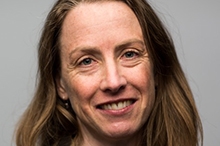

Amy Snover is being honored as a Climate Education and Literacy Champion of Change.
It is often said that we don’t know enough about climate change to take action. But we know that the choices we make today about energy use and preparing for a changing climate will shape the challenges and opportunities of the 21st century.
We know that large reductions in global emissions of heat-trapping gases could help us avoid the most damaging impacts of climate change. We know that preparing for a changing climate can prevent needless and costly harm. And we know that many of the changes necessary to reduce the negative effects of climate change will take time to implement and would benefit from careful risk assessment, planning, and a sustained and engaged civic discussion about priorities and appropriate responses.
We also know that none of us can solve this alone, within our silos, with our limited tools and skills. Building climate resilience requires melding the knowledge and prediction of science with the best ideas, creative energy, and practical insights of business, policy and planning, the arts and humanities, and community organizations. This is why it’s so important to build an educated, this-generation American workforce that grasps the climate-change challenge and is equipped to seek and implement solutions.
Since 1996, I’ve worked with the Climate Impacts Group at the University of Washington’s College of the Environment to develop, deliver, and support the use of decision-relevant science on climate impacts and adaptation, in order to build a climate-resilient Northwest. I began as a student, on a leave of absence from my graduate program, searching for ways to better connect the analytic and predictive skills of science with the practical needs and multiple objectives of real-world decision making. After helping to convene the first-ever discussion of climate-change risks and response options in the Northwest, and preparing the scientific summary to support that discussion, I was hooked. This was the meeting ground I was looking for: scientists, resource managers, policy makers, citizens, and business leaders working together to identify concerns, critical knowledge gaps, and ways to use existing scientific knowledge to advance societal objectives.
At the Climate Impacts Group, we take this multi-faceted approach every day. We work with local, regional, and national decision makers, planners and resource managers, tribes, non-governmental organizations, and private industry to develop a common understanding of the ways climate fluctuations can influence desired outcomes, and to identify knowledge gaps precluding climate-resilient decision making. We assemble the best interdisciplinary scientists – atmospheric scientists, water-resource engineers, coastal economists – to address these gaps. Through trainings, technical advising, ground-breaking guidance, and long-lasting relationships, we build local capacity for applying science-based climate information, tools, and expertise in planning and risk management. And we’ve made a difference. The Northwest is home to many of the nation’s leaders in climate preparedness and resilience.
Sixteen years after completing my PhD and re-joining the group as a post-doc, I am proud of all that we’ve accomplished together and am honored to be recognized as a White House Champion of Change. The most exciting part of all of this for me continues to be bridging the gap between science and practice – not only assembling, interpreting, translating, and delivering state-of-the-science understanding about climate risks facing the Northwest – because you can’t address risks that you don’t know about – but working with practitioners to develop guidance on how to apply climate information in their work today. As more and more people face the question, “What needs to change in the way we do business to set ourselves up for success as the climate changes?,” we’re ready to help them find answers.
Amy Snover, PhD, serves as Assistant Dean for Applied Research and Director of the Climate Impacts Group at the University of Washington.


